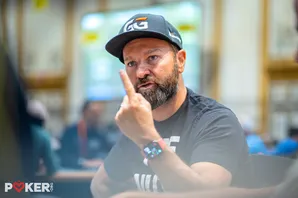Andrew ‘LuckyChewy’ Lichtenberger is considered one of the best high-stakes MTT pros in the game, with career earnings of more than $20,000,000. In an ongoing series for PokerOrg, he outlines his approach to some of the strategic and mental aspects of poker.
Many things make poker the appealing game that it is to millions of people worldwide. I think of all the things that differentiate it from other games, the most notable aspect is deception - which prominently manifests itself as bluffing! Do you want to learn more about bluffing and bluff catching? If so, this article is for you.
Bluffing is an art form
Bluffing and bluff-catching are major focal points of the game. These aspects, admittedly heavily distilled from other relevant factors that drive decision-making, have more impact than any other, in my opinion. They are simple components entirely born out of the lack of complete information that we as players have in the game. The unknown keeps us coming back for more.
In poker, some players have better results than others. What fundamentally leads to this, though? I’ve often thought that a basic way to explain it is as follows: the best players get more value by tactically navigating situations with their best hands and lose less (or even win) with their worst ones. Naturally, this comes down to an artful implementation of strategy. Knowing when to bet, fold, raise, and check or call. What are the means by which this works, though?
Using more modern ideas based on hand-history tracking software, a useful way to conceptualize this would be the ‘blue-line’ vs. ‘red-line’ synopsis - or more practically, ‘showdown winnings’ vs. ‘non-showdown winnings’. The latter is heavily predicated on successfully bluffing, since winning at a high clip over many hands without reaching showdown is unlikely to be due to a consistent and steady influx of strong made hands that you’re being dealt.
What is the essence of deception in poker?
I think about it like this: ignoring strategy for a moment, let’s acknowledge our human-ness. This sometimes gets overlooked in an era of poker with highly advanced strategies that poker tech has offered us, and the choice to forego emotions in lieu of logic. Speaking from experience, I have a much higher success rate bluffing when the bluff I am making feels right. This feeling is not entirely transcendent of logic, but instead comprises both logic and emotion. I find that when I really believe myself, my opponent is a lot more likely to believe me, too.
Naturally, knowing how to strategically approach bluffing makes a world of difference in the process of executing high-risk plays. I feel quite strongly that the more in touch you are with your emotions in these big moments, the greater the chances of success. It goes beyond bluffing, too, as poker - especially in a tournament format - can be extremely volatile and require one to be even-keeled in the face of adversity, as well as humble in the highs of victory.
I’ve had plenty of experiences in big moments where following my heart led me to success that my mind alone would have been wholly incapable of, due to the limitations the mind naturally runs up against. Deception is really the name of the game in poker. If you can trick your opponent to call when you’re value betting and fold when you’re bluffing - you’re all set!
There’s always a time and a place
Last year I was playing heads-up in the $300K Super High Roller Bowl against Ike Haxton. We played a big hand where he limps with 4.425m chips at the 50K BB level, and I raise to 200K with 
My thoughts were that it was appropriate to raise some trash hands against his limping range, and this spot seemed reasonable enough to attack. My goal is to just fold out various weak holdings he may have, which are decidedly good enough to call the blind but not good enough to call facing a raise. Plenty of these hands will be of the J/Q/K-high variety and it’s pretty advantageous for me to get him to fold a better hand while being in position. I’m going to be unlikely to win the pot postflop with this weak of a hand in general, even against lesser holdings, so it makes sense to sometimes pounce now and let the strength of my range overall support an aggressive action with a relatively weak hand such as this one.
Flop comes 
The turn comes the 
River is the 
I hold the 

Ultimately, I decide to call, and much to my relief, Ike turns over 
Taking these lessons off the felt
I’ve often felt that poker is an incredible proxy for learning life skills, which are packaged in the ways that we necessarily have to overcome by sometimes going deep within ourselves and being honest about what is really happening internally.
Trusting ourselves and listening to our heart in big moments in our life are only a few important things that the game can offer us. We would be wise to learn from them and self-correct before life forces us to do so!
Andrew Lichtenberger co-founded the poker community and training site Octopi Poker with Nick Schulman and Victoria Livschitz. Octopi Poker uses GTO tools, drills, coaching, and streamed hand histories for an all-in-one integrated platform for collaborative poker study. Follow Andrew on Twitter/X.
Images courtesy of Antonio Abrego/PokerGO
























